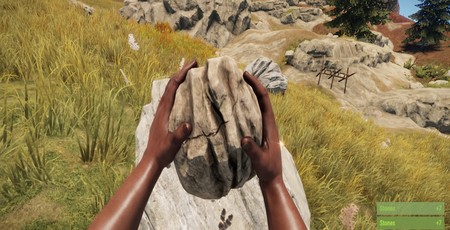
Price: £27.99
Developer: Facepunch Studios
Publisher: Facepunch Studios
Platform(s): PC
Few games do death quite as ignominiously as Facepunch Studios' Rust. During my time playing I've starved to death, been gored by wild pigs, fallen from cliffs, and once drowned in a freezing lake after falling off a shipwreck. I've been chased through the woods by men with crossbows, brutally hacked to death with a stone hatchet, impaled upon a spear and left to bleed out, and murdered in my sleep.
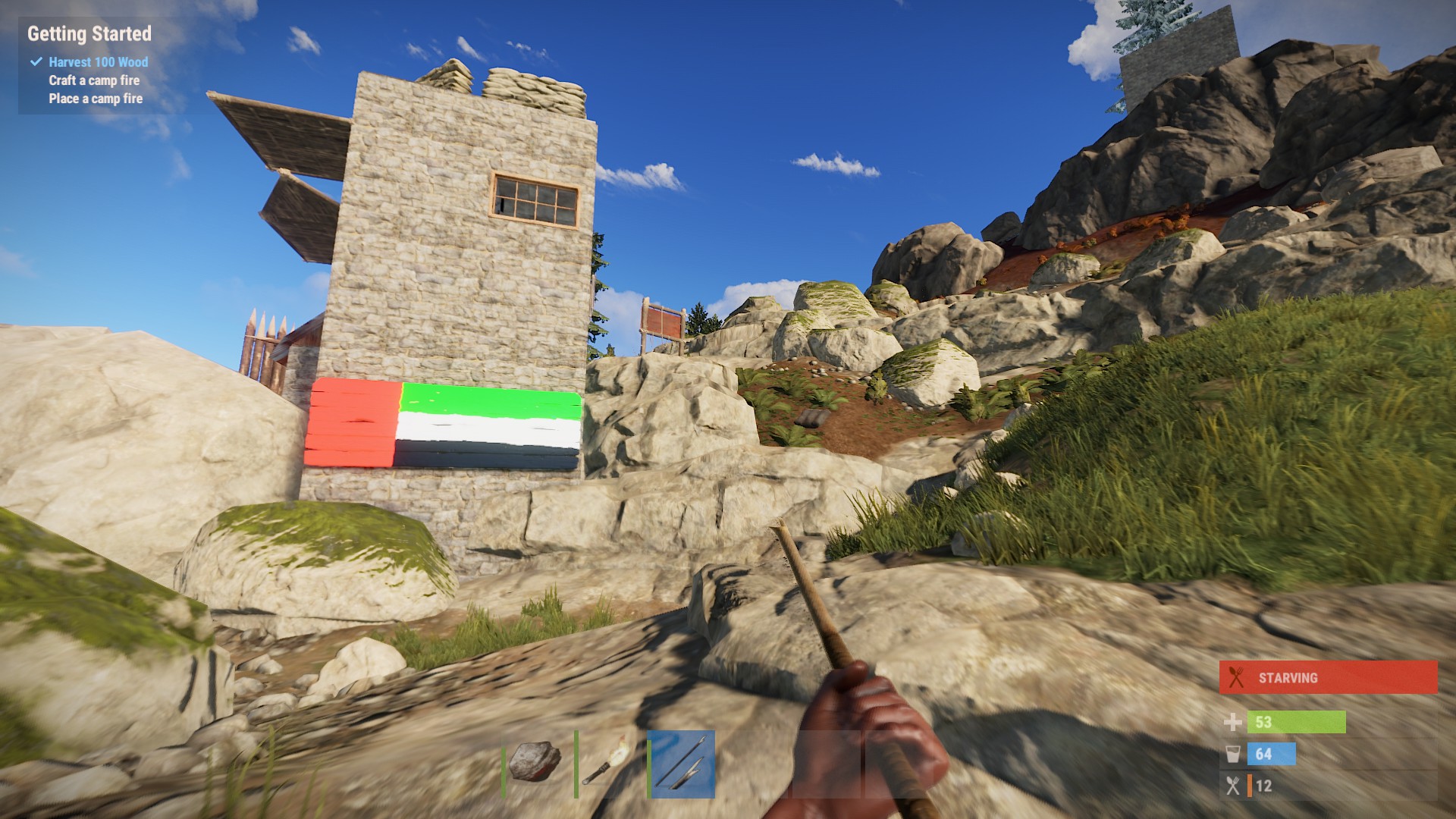
Most of these times my character has been entirely naked, and in several cases so has my killer. In one particularly memorable instance, I encountered a woman with no trousers on, wielding a stone axe. I was armed with a basic wooden spear, and we stood squaring each other up for several minutes before she decided to retreat. I figured that was the end of it, but a short while later she returned, having retrieved a gun from somewhere, and shot me in the chest. Mortally wounded, I lay there helpless as she walked over, pulled out a spear of her own, and finished the job.
Such brutality is Rust's defining characteristic, one which arguably makes it the ultimate survival game. Rust forces players to contend with almost every kind of threat imaginable, from wolves to tanks, from stone age tools to nuclear radiation. It combines a technology tree that ranges from the neolithic to the Anthropocene, with a mentality that is rooted squarely in the former of those two eras. The result is a world where semi-nude cavemen are mercilessly gunned down by marauding bands of super-soldiers. There are no rules governing player interaction. You're fair game at any time by anyone, and the only way to stay alive is to be stronger, smarter, and more capable than the people around you.

Beyond the fact that Rust is tough and often nasty, is there anything else that's special about it? This is a question I find harder to answer. There are certainly aspects to Rust that I like, and of the survival experiences out there it's one of the more polished and comprehensive offerings. But when you look around at many of Rust's contemporaries, it's difficult to deny that there are far more interesting and innovative experiences within this particular sphere.
Perhaps this shouldn't be surprising. Although Rust has only just officially launched, this is not a new game. Rust first released in 2013, following hot on the heels of DayZ to capitalise on the sudden craving for gritty, player-driven survival experiences. At the time, Rust distinguished itself from the ArmA II mod through its detailed crafting system, switching the focus from looting dishevelled post-Soviet buildings to crafting basic tools and structures.

Since then, the developer's emphasis seems to have mainly been on deepening and refining these systems, and the resulting game is both visually rather pretty and plentiful in its content. Like DayZ, your character awakes near the coast of the game's fictitious island hellscape. Unlike DayZ, your character is entirely naked. Both their gender and ethnicity are automatically and permanently assigned. Your inventory contains just two items, a rock and a torch (never use the torch, it will get you killed). The game provides no guidance, only simple instructions such as “collect wood” and “make a campfire”.
Unless you're extremely lucky, your first few lives in Rust will be brief and horrible. You'll wander randomly around the island, hitting stuff with your rock to see if it drops resources, all while watching your food and water bars deplete with alarming speed. You'll probably begin to starve, as there are no obvious food sources other than animals that are tough to kill. But chances are you won't actually succumb to starvation. It's far more likely you'll be casually murdered by someone passing by.
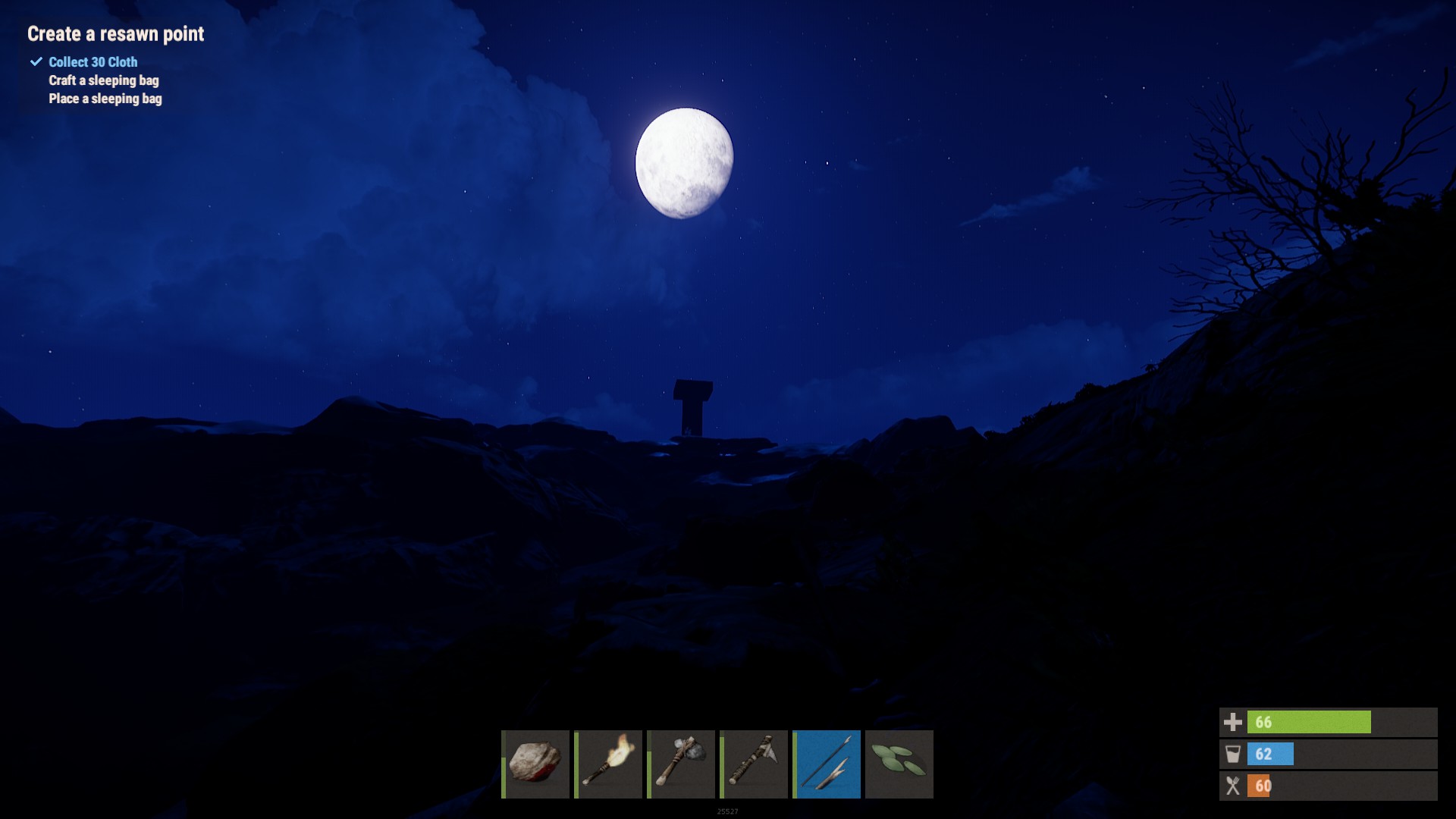
Through agonising trial and error, however, you'll gradually learn how Rust works. Much of it is familiar to other survival games – wood comes from trees, stone from rock deposits. Combine the two to make a tool that lets you mine these resources faster. What makes Rust (slightly) different, however, is that you're often doing these basic tasks in the shadow of massive, heavily fortified player-built castles. Not all of these structures are necessarily inhabited – player-raids on bases are a constant threat. Nonetheless, gathering mushrooms naked while a player-built Fort Knox looms over you is a strange and surreal experience.
At a systems level, Rust doesn't break many moulds, but those systems are themselves nicely moulded. Simple actions such as hitting a rock or a tree or a human skull provide satisfying feedback, while the crafting menu is straightforward and intuitive, although the crafting itself mainly involves waiting for a timer to countdown before the item appears in your inventory. A little feature I particularly like is that you can throw spears and then retrieve them, a tactic I used in one game to kill a horse that had got trapped amidst a rocky outcrop.
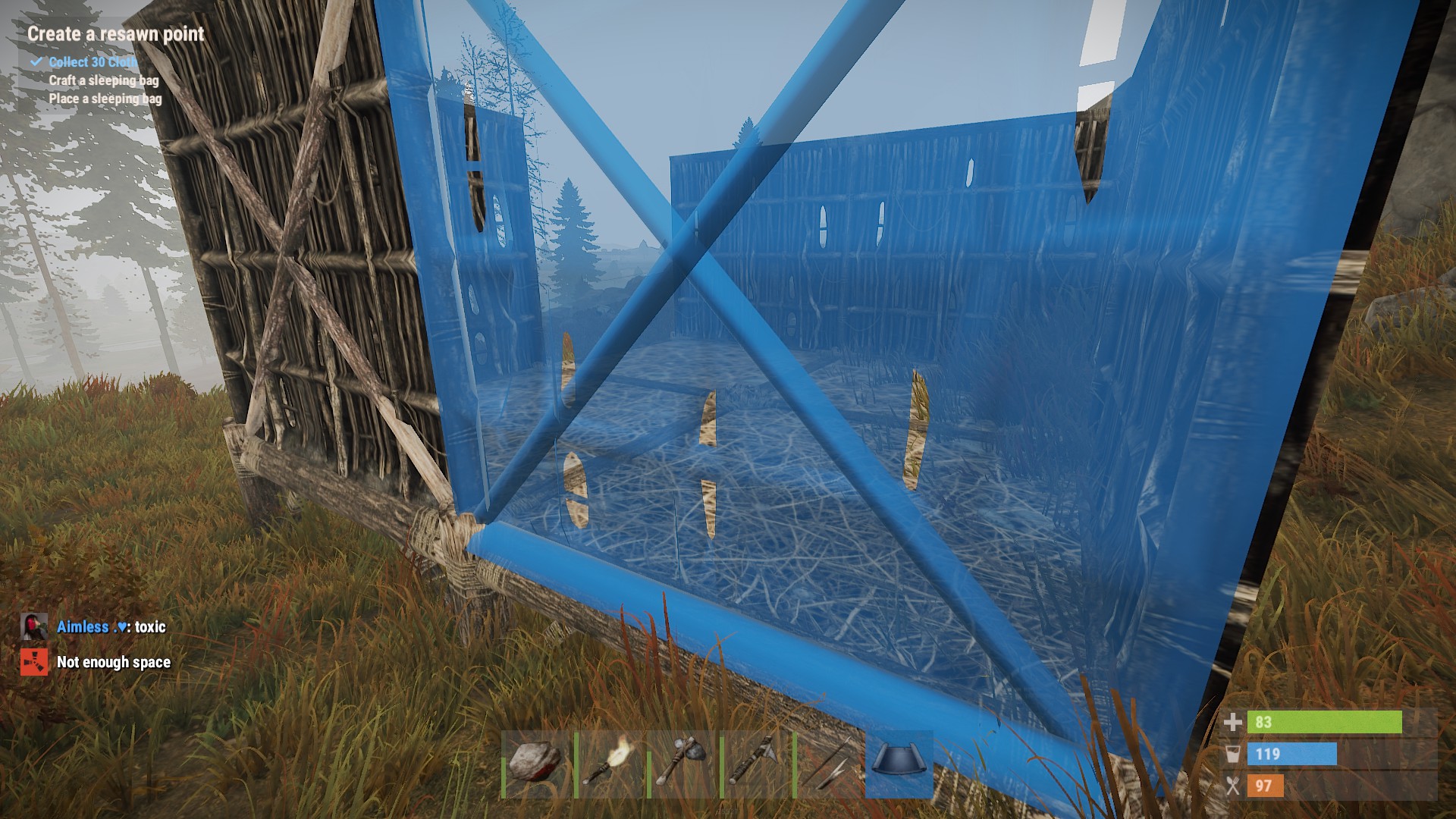
The base-building mechanic is also one of the most intuitive and smartly tuned examples I've come across in a survival game. Using a radial menu to select floors, walls, roof tiles, etc., you can construct a simple wooden hut in a matter of minutes (once you've collected enough resources, anyway). The snap-to grid is far slicker and more lenient than, say, that of Subnautica, while there are lots of neat little objects you can fill your base with, such as forges, storage boxes, and code-locks to keep out chancing thieves. Normally I find base-construction in games about as enjoyable as filling out my tax return, but Rust's system is fantastic to plat with. It's so good, in fact, that it's a shame you have to go through so much pain to build even the simplest edifice.
This is where I begin to find myself at odds with Rust. I found it too grim and nihilistic to get much enjoyment out of. It isn't merely that it's difficult, the whole tone of the game is designed as a petri-dish for all the worst aspects of humanity to breed. The community is also pretty toxic. Racism and misogyny is endemic in the global chat, and I've seen my fair share of swastikas painted on the walls of player bases. This isn't to say that it is entirely without humour or more pleasant moments. One player I chanced upon shot me with an arrow and incapacitated me, but instead of finishing me off, for some reason he decided to pull me back onto my feet. I was so shocked that I didn't realise I wasn't dead for about 30 seconds. Such experiences are rare indeed, but they do happen.
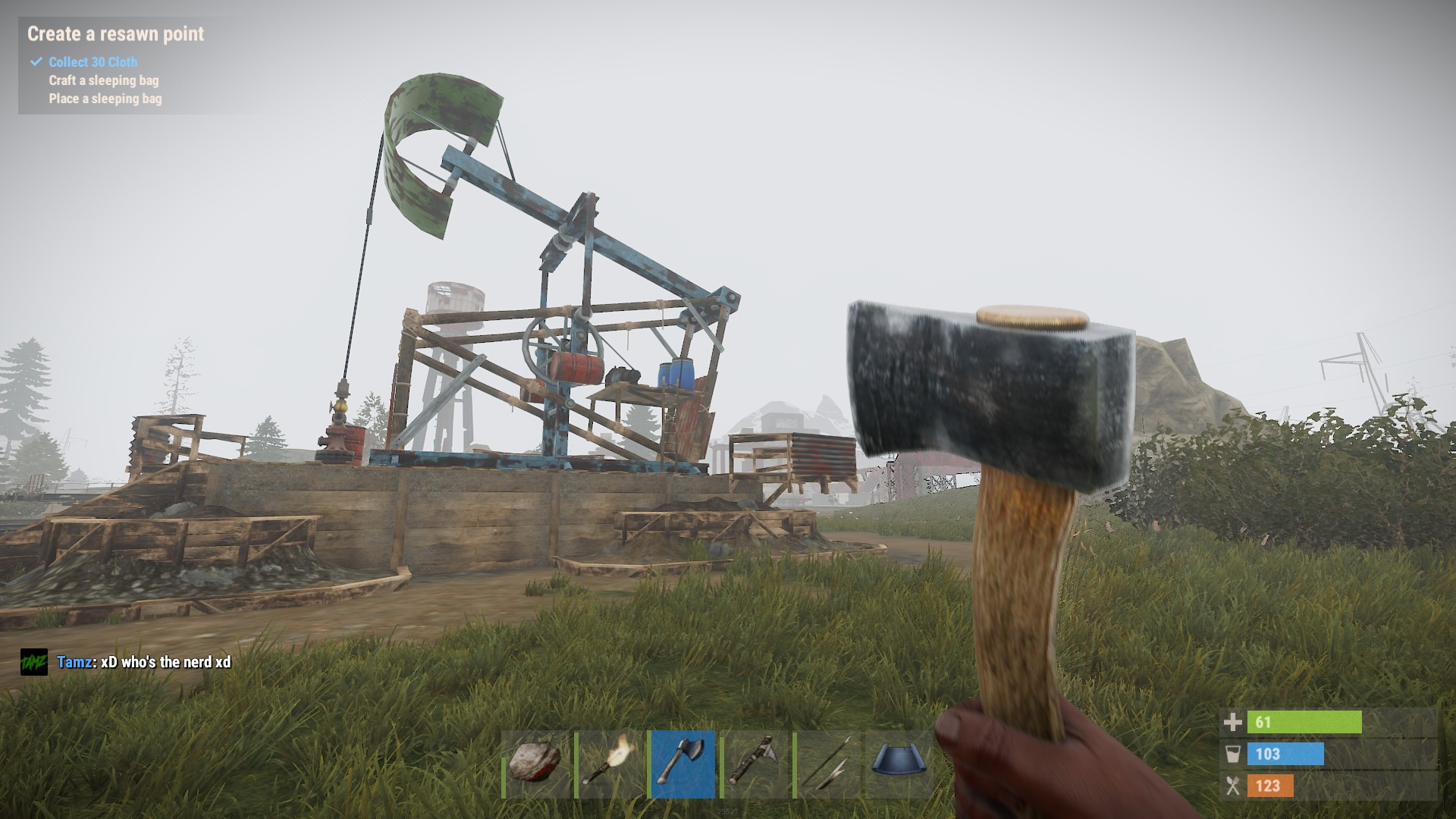
A bigger issue is that, beyond its misanthropic world and the community that has emerged from it, Rust is pretty derivative. It's certainly capable of producing those strange and unique stories that we crave from video games, but the core of what you're doing from moment to moment differs little from a dozen other survival games out there. It is arguably more polished than the majority of its competitors, but that's the only notable way in which Rust's mechanics stand out.
If you want to play an enjoyable and satisfying survival game, then I'd recommend you check out Subnautica or, if you want something more challenging, The Long Dark. If you want to play a tense and thrilling multiplayer where death lurks around every corner, then PlayerUnknown's Battlegrounds provides more excitement for less time investment. If, on the other hand, you want to get stabbed to death by a half-naked woman with a spear, then and only then do I thoroughly recommend rust.


MSI MPG Velox 100R Chassis Review
October 14 2021 | 15:04








Want to comment? Please log in.